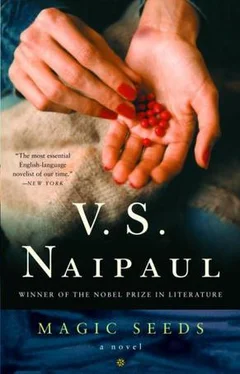Roger said softly to Willie, “They’re confused. They’re not too well educated. That was the smart thing at one time. But now they don’t know who they are and what’s expected of them. The world has changed much too quickly for them. Perhaps they don’t feel a great deal about anything, and have been confused for the last hundred years.”
The priest’s vestments, too ornate in the setting, sat stiffly on him. He seemed to be unused to them — they seemed to be heavy for him, to be threatening to slip off his shoulders: perhaps he hadn’t put them on correctly — and he appeared to be fighting back a smile at the dignity of the garments even while struggling as quietly as he could to keep the extravagant things in place.
And after all this — the signs, the setting, the tents and canopies, the miraculous strained light — Lyndhurst, big-chested, thuggish-looking, with Africa more than half scrubbed off him, and his pale plain bride, in her simple silk frock, seemed curiously ordinary. Even with the theatre of the two pages, their children, one dark, one fair, the fair supporting the groom, the dark supporting the bride. Bride and groom had wished to have a simple occasion, and they had succeeded more than they knew.
The priest had a faraway plebeian accent, very difficult for many people in the enclosure, and he was as little used to reading aloud as he was to his fine vestments. He chewed up his words; their fineness seemed to embarrass him.
Someone from one side read a speech from Othello, and someone from the other side began to read a Shakespeare sonnet. Before the sonnet was through, one of the pages farted, and no one knew whether it was the dark page or the fair one. But the guests lined up correctly on this matter: the dark people thought the dark child had farted; the fair people thought it was the fair child.
The fair child began to cry. She was in some distress. Marcus ran to her, took her little hand and began slowly to walk her out of the box enclosure to where the toilet facilities were. Someone, an old lady, seeing the old grey-haired black man running to the distressed white child, imagined old sentimentalities and involuntarily clapped, very delicately; then someone else clapped; and then Marcus and his grandchild were walking to general applause, and Marcus, understanding only after some seconds that the applause was meant for him, and meant kindly, began to smile, looking to left and right, bowing slightly, and leading the white child to where she wanted to go.
The Aruba-Curaçao band, when they began to play, were fierce. The black drummer sat at a drum as high as a dining table. At first, easing himself into his chair and settling his wrists on the edge of the high drum, he looked only like a man about to eat or to write a letter. But then, while he held his upper body perfectly still, his big hinged hands began to work. He struck with the heel of the palm, the full palm, the palm immediately below the fingers, and the fingers, striking them flat and with the tips. He worked every part of the open hand separately. His fluttering palms showed red, creating a volume of sound that rocked and boomed below the tents and put an end to easy conversation. Other metallic instruments of the Dutch Antillean band then obliterated such patterns as the drum made, and over it all someone began to sing an amplified song in a Dutch Antillean patois that no one there could have understood. The din was fearful, but some of the fair women in new frocks were swinging their slender shanks, as if they were picking out a beat, and it was already too much to resist, though the dinner was still some time off, and the dancing away of the night was not to begin until after dinner.
Roger said, “I’m getting a migraine.”
He and Willie walked back to their hired car. At this distance it was possible to hear something of the two or three patterns of the music.
Roger said, “It’s meant to stun you. I don’t know what it tells you about the occasion we’ve just left. I imagine music like that being played on a Dutch slave plantation in Suriname in the seventeenth or eighteenth century. Played on a Saturday or Sunday evening, to reconcile the slaves to Monday morning, and giving some visiting Dutch artist an idea for a plantation night-piece. I’ve seen a painting like that.”
THEY DROVE BACK to the hotel, along the winding road, and they found, to their amazement, that the music was still with them. They could, if they had known, and if a path existed, have walked from the hotel up to the cliff where the abandoned big house was.
All night Willie heard the music. It invaded his sleep and mingled with other memories. Africa, with the conical grey stone hills and Africans walking on the red paths beside the asphalt road. The burnt-out concrete houses, smoke-stained around the windows. The forest and the men in olive uniforms with caps with the red satin star, and the endless marching. The strange jail where, as on a slave ship, the prisoners lay side by side on the floor in two rows separated by a central aisle. All night it seemed to him as well that he had found something good to write to Sarojini about. This thing eluded him. He looked for it, through all the slave music, and in the morning all he was left with was: “It is wrong to have an ideal view of the world. That’s where the mischief starts. That’s where everything starts unravelling. But I can’t write to Sarojini about that.”
September 2002–September 2003









